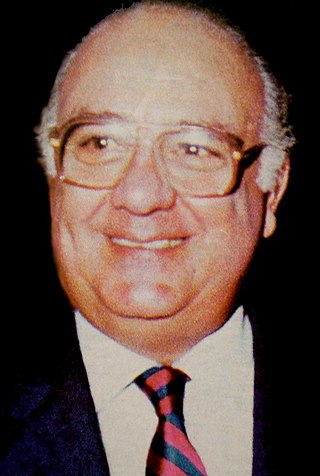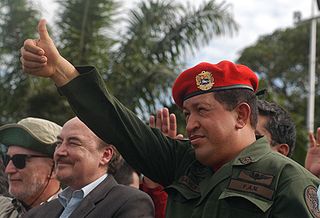
The National Bolivarian Armed Forces of Venezuela are controlled by the Commander-in-Chief and the Minister of Defense. In addition to the army, navy, and air force there is also a national guard and national militia primarily focused on internal security.

Venevisión is a Venezuelan free-to-air television channel and one of Venezuela's largest television networks, owned by the Cisneros Media division of Grupo Cisneros.

The Bolivarian Revolution is an ongoing political process in Venezuela that was started by Venezuelan President Hugo Chávez, the founder of the Fifth Republic Movement and later the United Socialist Party of Venezuela (PSUV), and his successor Nicolás Maduro. The Bolivarian Revolution is named after Simón Bolívar, an early 19th-century Venezuelan revolutionary leader, prominent in the Spanish American wars of independence in achieving the independence of most of northern South America from Spanish rule. According to Chávez and supporters, the Bolivarian Revolution seeks to build an inter-American coalition to implement Bolivarianism, nationalism and a state-led economy.

Jaime Ramón Lusinchi was the president of Venezuela from 1984 to 1989. His term was characterized by an economic crisis, growth of the external debt, populist policies, currency depreciation, inflation and corruption that exacerbated the crisis of the political system established in 1958.

A failed coup d'état on 11 April 2002 saw the president of Venezuela, Hugo Chávez, ousted from office for 47 hours before being restored to power. Chávez was aided in his return to power by popular support and mobilization against the coup by loyal ranks in the military.

El Tanquetazo or El Tancazo was an attempted coup d'état that occurred in Chile on 29 June 1973.

The Caracazo is the name given to the wave of protests, riots and looting that started on 27 February 1989 in the Venezuelan city of Guarenas, spreading to Caracas and surrounding towns following austerity measures from President Carlos Andrés Pérez. The weeklong clashes resulted in the deaths of hundreds, thousands by some accounts, mostly at the hands of security forces and the military. The riots and the protests began mainly in response to the government's economic reforms and the resulting increase in the price of gasoline and transportation

The Venezuelan coup attempt of February 1992 was an attempt to seize control of the government of Venezuela by the Hugo Chávez-led Revolutionary Bolivarian Movement-200 (MBR-200) that took place on 4 February 1992. The coup was directed against President Carlos Andrés Pérez and occurred in a period marked by economic liberalization reforms, which were attempted in order to decrease the country's level of indebtedness and had caused major protests and social unrest. Despite their failure to depose the government of Carlos Andrés, the February coup attempts brought Chávez into the national spotlight. Fighting during the coup resulted in the deaths of at least 143 people and possibly as many as several hundred.
Plan Ávila is a military contingency plan by the Venezuelan Army to maintain public order in the Venezuelan capital, Caracas. The plan was first implemented in 1989 by the Carlos Andrés Pérez government in response to the Caracazo riots, where hundreds were killed by military and armed police as a result. President Hugo Chávez also ordered the plan to be activated in response to the 11 April 2002 events, but high-ranking members of the Armed Forces refused to carry out the plan, fearing to prevent a massacre like the Caracazo.

The military career of Hugo Chávez spans the seventeen years (1975–1992) that the later President of Venezuela spent in the Venezuelan army.

Manuel Antonio Rosales Guerrero is a Venezuelan educator and politician, current governor of Zulia. He was the most prominent Venezuelan opposition candidate in the 2006 presidential election, losing to incumbent Hugo Chávez. He served as a congressman, mayor, and governor, but in April 2009, stepped down as Mayor of Maracaibo when he was charged with corruption in Venezuela and fled to Peru. Rosales denies the charges, and was granted political asylum in Peru. He is currently the presidential candidate for Un Nuevo Tiempo in the 2024 Venezuelan presidential election.

The Republic of Venezuela was a democratic republic first established in 1953, and replaced in 1999 by the Bolivarian Republic of Venezuela. Venezuela saw ten years of military dictatorship from 1948 to 1958. After the 1948 Venezuelan coup d'état brought an end to a three-year experiment in democracy, a triumvirate of military personnel controlled the government until 1952, when it held presidential elections. These were free enough to produce results unacceptable to the government, leading them to be falsified and to one of the three leaders, Marcos Pérez Jiménez, assuming the Presidency. His government was brought to an end by the 1958 Venezuelan coup d'état, which saw the advent of democracy with a transitional government under Admiral Wolfgang Larrazábal in place until the December 1958 elections. Prior to the elections, three of the main political parties, Acción Democrática, COPEI and Unión Republicana Democrática, with the notable exclusion of the Communist Party of Venezuela, signed up to the Puntofijo Pact power-sharing agreement.
Ramón Rodríguez Chacín is a Venezuelan politician. A retired naval officer, he was Minister of the Interior and Justice in 2002, and again in 2008. He took part in the November 1992 coup attempt.
The Movimiento 2D is a Venezuelan opposition movement led by El Nacional editor and proprietor Miguel Henrique Otero.
The second presidency of Carlos Andrés Pérez (1988–93) started with an economic crisis, a major riot in which hundreds were killed by security forces, followed by an economic recovery by also two coup attempts in 1992, and his 1993 impeachment. He was the first Venezuelan President to be impeached.

23 de Enero is a parish located in the Libertador Bolivarian Municipality west of the city of Caracas, Venezuela. The parish receives its name from the date of the 1958 Venezuelan coup d'état which overthrew dictator Marcos Pérez Jiménez.
Fernando Antonio Ochoa Antich is a Venezuelan lawyer, diplomat and politician, and retired general. He is a columnist with the El Universal newspaper.

The Llaguno Overpass, also known as the Llaguno Bridge, is a bridge in central Caracas, Venezuela, near the Miraflores Palace, made infamous by the events of 11 April 2002, when a shootout took place between the Caracas Metropolitan Police and the pro-government Bolivarian Circles, also known as El Silencio Massacre, causing 19 deaths and 127 injured people. The events preceded the 2002 Venezuelan coup attempt. The military high command refused Hugo Chávez's order to implement the Plan Ávila as a response to protests against him, a military contingency plan by the army to maintain public order last used in 1989 during The Caracazo, and demanded him to resign. President Chávez was subsequently arrested by the military. Chávez's request for asylum in Cuba was denied, and he was ordered to be tried in a Venezuelan court.
The Venezuelan coup attempt of November 1992 was an attempt to seize control of the government of Venezuela that took place on 27 November 1992. group of young military officers who were loyal to the Hugo Chávez-led Revolutionary Bolivarian Movement-200 (MBR-200), while Chávez was in prison for the February 1992 coup d'état attempt.

Coups d'état in Venezuela have occurred almost since the foundation of the Republic. Throughout the history of Venezuela, insurrections, uprisings, or military or civil revolutions were used to overthrow and replace governments. These coups were performed using force, intimidation, and pseudo-legal methods. Gradually with the consolidation of a democratic system in the country, coups became less and less common.
















